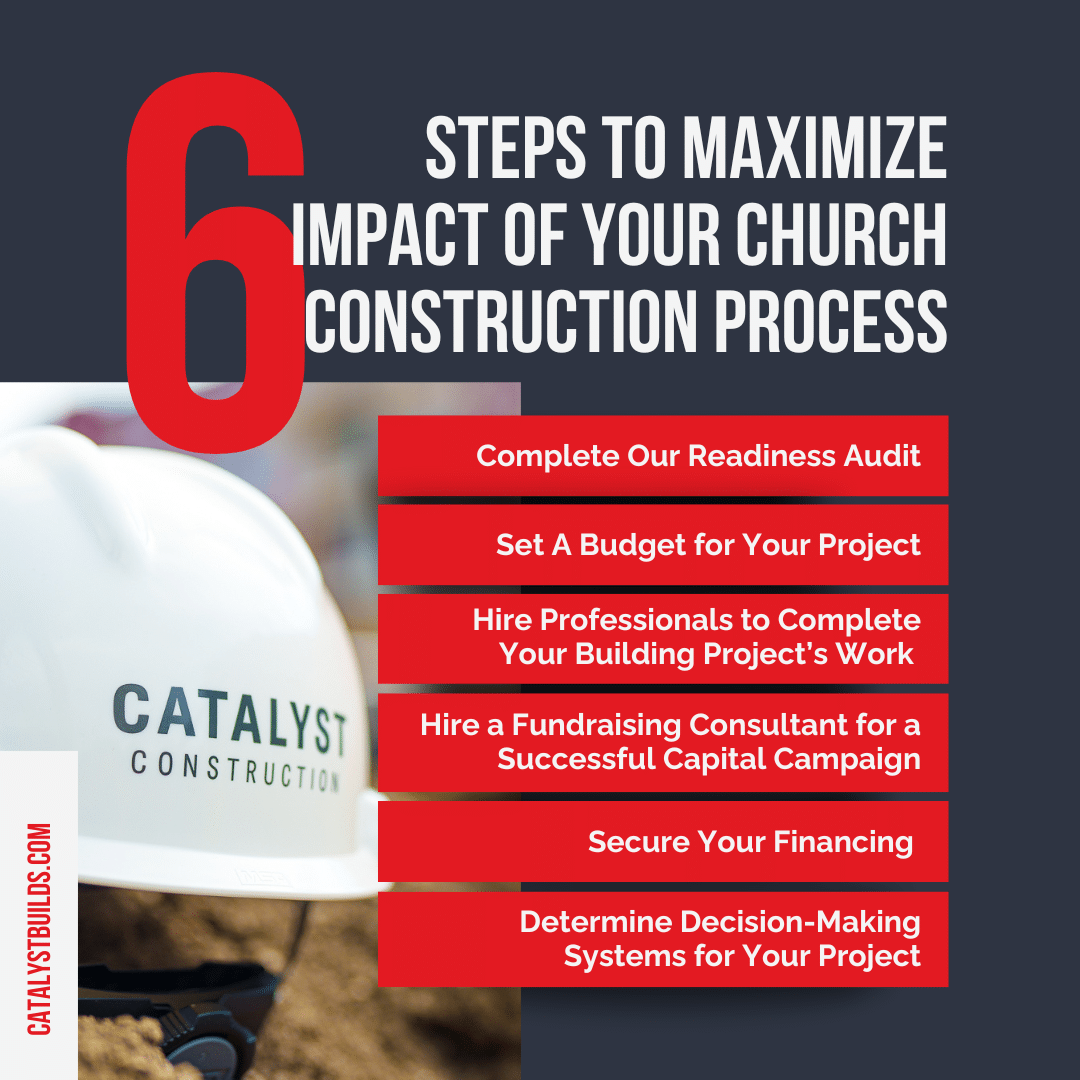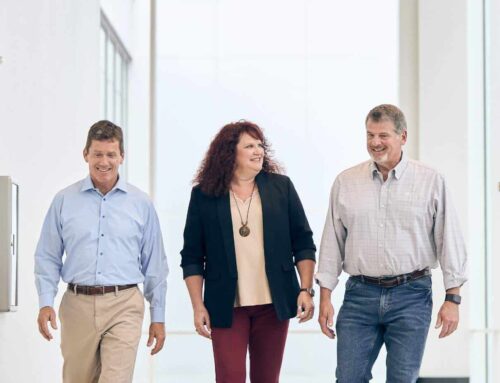Do you know how long it takes to become an expert in a given field? Most researchers suggest you must invest no less than 10,000 hours of intentional practice to become an expert.
For those leading their church through a church construction process, no one will blame you for not being an expert!
But they might blame you for trying to be.
You don’t have to make your own mistakes. You can benefit from what others have already learned the hard way.
If you’re considering taking on a church building project, your first decisions will determine the difficulty of your path.
While every construction project has its challenges, there is a process you can implement to alleviate unnecessary complications and maximize your impact.
Church Building Projects Must Embrace Wisdom and Faith
One of the roadblocks churches can run into with construction projects is over-spiritualizing the process. Please let me explain.
In one sense, I understand that we must acknowledge the spiritual reality of everything we do. We cannot and should not compartmentalize our faith from our work.
When taking on a church construction project, you must navigate the tension between trusting God – and – testing God.
Making strategic plans, learning from others, and listening to wise counsel – are all thoroughly commended by God in His Word and through experience.
Since 2004, we’ve helped churches realize their vision through successful building projects. We’ve learned a few things along the way and would love to guide you down the right path!
The 6 Steps to Streamline Your Church Construction Process
Ready to put our experience to work for your congregation? Let’s dive in!
1: Complete Our Readiness Audit
How do you know when your church is ready for a significant building project? Don’t breeze over this question. The answer is more involved than you may initially think.
If you pulled all of your leaders in a room, how much consensus do you think there would be on the following questions;
- Do you know what we are building?
- Do you know why we are building it?
- Do you know how we are building it?
After meeting with hundreds of churches, I discovered it is rare for churches to be able to answer these questions with the consensus or confidence necessary to begin a building project.
That’s why I created a readiness audit to guide churches through a successful church construction project. If your leadership isn’t aligned with your building project’s vision, mission, and process, your church will be pulled in different directions throughout the entire process.
However, if you create consensus and maintain alignment, you will enhance efficiency and create a bonding, unifying experience that will bless your church far beyond the walls of the building.
2: Set a Budget Within your Church Building Process
If you contact a real estate agent to buy a house, what’s one of their first questions? They want to know your budget. Many real estate agents won’t even begin showing you homes until you’ve been pre-approved for a specific amount.
Churches should follow this example when taking on a building project. Too often, they start with a dream – and then blur the lines between dreams and needs.
Then, they meet with professionals to draw up their dreams and let that determine their budget. But 99 times out of 100, this results in wasted time, frustrated leaders, added costs, and even hurt feelings.
Why?
Because you have no idea whether or not you can afford to fund the dreams the architect drew up. Typically, you won’t be able to.
Most churches don’t provide an architect with boundaries – and ask them to draw up their dream building. That almost always costs more than a church can afford. This is why you must set your budget at the beginning of the process. Here’s how.
- Determine available assets
- Discover how much money you can fundraise
- Decide what you’re comfortable financing
If you’re unsure how to craft a budget, our church construction experts can help! Armed with definitive information, you can consult an architect and contractor to obtain realistic renderings and accurate estimates.
3: Hire Professionals to Complete Your Building Project’s Work
It’s wise to receive a quote from several companies before hiring them. During this process, you should discern the areas of expertise each company has.
Not all experience is equal. For example, some contractors only offer self-perform services. Which can have some advantages in particular situations.
However, if you hire a self-perform contractor, you won’t be able to utilize volunteer labor from within your contractor. You also won’t be able to hire subcontractors from within your congregation to complete the work.
Professionals to Hire for a Smooth Church Construction Process
The two primary professionals you must hire when taking on a church building project are:
- Architect
- General Contractor
Depending on who you hire, you may be able to enlist other subcontractors. Still, an architect and general contractor is where you need to start.
If you can provide them with a budget and overall vision, you’ll be on your way to begin a smooth building project.
4: Hire a Fundraising Consultant for a Successful Capital Campaign
We recommend hiring a fundraising consultant. Some are understandably uncomfortable with this. Hiring a company to run a capital campaign will cost you money. But not hiring one will cost you more. Hiring the wrong one will cost even more.
You should meet with several fundraising consultants before determining who you’ll entrust to guide you through this process would be wise.
Successful capital campaigns have multiple phases and require a significant amount of intentionality. Don’t settle for a consultant who doesn’t share your values or have a demonstrated track record of success.
5: Secure Financing for your Church Construction Project
Multiple paths are available to secure financing. You aren’t limited by the traditional banking system. Regardless of the lender you choose, you must know what level of financing you are preapproved for and when you can begin receiving funds.
Interview multiple banks and lenders to determine the best fit – and the best deal – for your congregation.
6: Determine Decision-Making Systems for the Duration of Your Church Building Project
Most churches have decision-making systems in place to handle the week-to-week activity. When a large building project enters the picture, the current system can no longer support the dramatic increase in the number of decisions or the speed at which decisions must be made.
If the decision-making process is not simplified during this phase, frustration can set in and cause the project to slow to a crawl.
Empower a Steering Committee to Drive Your Church Construction Process
We have found that church construction projects experience the most momentum and least friction when a small, qualified, trusted team is responsible for making final decisions.
This team, often called a “steering committee,” should be no less than three people but no more than five. The steering committee should be populated by humbled, trusted, invested leaders. They should be empowered to make decisions without needing to work through an approval process.
In most building projects, multiple teams are needed to get to the finish line. Each team should appoint one person to communicate with the steering committee.
When you streamline communication in this way, you will eliminate so much friction and frustration. People will know who can answer their questions, who’s responsible for what tasks, and how decisions are made.
Take A Multi-Step Approach to Project Planning
The six steps listed should be taken in order of priority. However, don’t make the mistake of thinking that each step must be finalized before taking the next.
For example, you can collect bids from architects once you have a soft budget. At the same time, you can contact lenders to determine the rate and amount you’re preapproved for.
Multiple steps can and should be taken simultaneously – as long as they are taken in the proper order.
Get Your Church Construction Project Started On Time & Budget
Church building projects are defining moments in the life of your church. When done well, they can be unifying and energizing, maximizing your impact for years to come.
A building project isn’t only a high-reward proposition, though. It’s also high-risk. Many people have learned this lesson the hard way.
You don’t have to. We can help.
We celebrate over 45 completed projects – every year. We would be honored to guide your project to a successful conclusion.
Reach out today for a free consultation!






